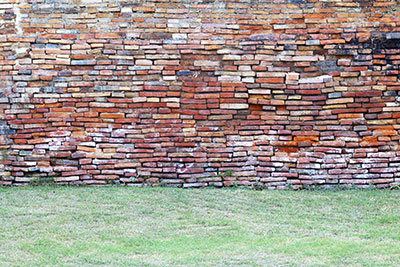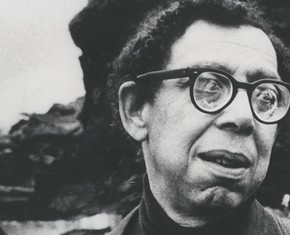The views expressed in our content reflect individual perspectives and do not represent the authoritative views of the Baha'i Faith.
This is Part 2 of the fiction story Giving the Devil His Due :
[In the first installment of “Giving the Devil His Due”, Bert Wells receives yet another reject slip for his socially conscious prose and is counseled by an agent (not for the first time) to give the reading public what it wants—cyber-shock. He is, in the immortal words of Blue Oyster Cult, in “the nexus of a crisis”.]
If anything is to be done, let a man do it; let him attack it vigorously! A careless pilgrim only scatters the dust of his passions more widely. — Gautama Buddha, Dhammapada, The Downward Path, v. 313.
For about the two billionth time Bert considered “giving the market what it wanted.” He knew he could do it… well, at least, he was pretty sure he could. After all, he had it on good authority that he possessed a “nice, tight style.” He had every confidence—well, at least a sneaking suspicion, that if he sent that bourgeoisie establishment pig-dog editor a cyber-shock novel, he’d woof it down like steak tartare—killer ‘bots and all.
Luddite.
The anger peaked, sending him on a slow glide toward the abyss of despair. Who was he kidding? He couldn’t write that crap. All that gore and sexual carnage—he just didn’t have it in him.
Sure you do, said a scoffing voice from left of center. All human beings have it in ‘em. You think you’re an exception? Are you sure you wanna be? Look at the prize—PUBLICATION. MONEY. AUTONOMY. CELEBRITY. You got the tools, bwana. You can exploit the unreasonable fears of your fellow men and women right up there with the best of ‘em.
Exploit? His brain braked in mid-meander. My God, he thought. What are you thinking? Exploit? Sell out? Pander to those antiquarian anarchists? This was a New Age. The publishing industry just hadn’t caught up yet. If he just hung in there, stuck it out-
Bull hockey.
He put down the cup of coffee. I need to get out, he told himself. Need to get out and take a walk; clear the chuckling dust bunnies out of my head.
He pulled on his coat, boots and a muffler, grabbed his portfolio and went out. Four aimless blocks later, he found himself wandering the River Charles. It was a much cleaner river than it had been last year at this same time and Bert tried to make that cause for celebration. A group of musicians had started that campaign, he recalled—a brigade of world-class rockers who had descended on New England like a plague of leather-clad locusts and bent the ears of every living thing in the Thirteen Colonies.
 Rock musicians were not inclined to beat around the bush; the message was blunt and to the point: Man was out of tune with the environment. If he didn’t get in tune instantly, the consequences would be devastating: Global warming, a new ice age, pollution toxemia—all frightening, but mere bagatelles compared to the real threat rammed home via synthesizer and power chord by the heroes of a new generation.
Rock musicians were not inclined to beat around the bush; the message was blunt and to the point: Man was out of tune with the environment. If he didn’t get in tune instantly, the consequences would be devastating: Global warming, a new ice age, pollution toxemia—all frightening, but mere bagatelles compared to the real threat rammed home via synthesizer and power chord by the heroes of a new generation.
TEEN REVOLT.
The rock slogan “Tune It Or Die” took on a whole new meaning when emblazoned across the chest of your fifteen-year-old’s green globe-and-crossbones T-shirt.
Bert stared at the water. A month ago that had been one of his fondest recollections—a story he loved to tell whenever some formaldehyde guzzling nerdle elevated his snoot and opined that the arts were sheer frivol. Now, it only made him feel worse about his own inability to make any difference to the planet. In the two years since he’d left university, all he’d managed to contribute to society was a mountain of waste paper and enough shredded manila to fill the Prud up to the thirty-first floor.
He stared down at the swiftly moving Charles—chin quivering, eyes moist, anger shriveling. Despair and gloom perched on his sagging shoulders like the Twin Ravens of Doom—foul-smelling, heavy-toed birds with smug, knowing faces. They reminded him of two of his college professors, Bernhardt Brecht and Madlyn Carrey, who had both told him his propensity for crusading would ruin him as a writer of fiction, if (and it was a BIG IF) he could ever contrive to WRITE WELL.
Face it, he told himself, you’re a wimp. A noodle. A wet rag. Couldn’t write your way out of a recycled paper bag…in the driving rain, even. If you could write—really write—they’d publish OF BLOOD DARK SKIES if it was a multi-generational pot boiler. You, Herbert George Wells, are no credit to your namesake. You, sir, are a fake—a failure.
The not-so-muddy river beckoned, singing the bawdy refrain of a song he was half a generation too young to remember. “Love that dirty water…”
Come on in, the water’s fine.
He sniffled, tucked his portfolio under one arm and swung a leg over the low stone parapet. Then he swung the other one over. He sat for a moment, facing the water, making his peace with the Universe.
Sorry, God, he apologized. I’m a wimp. But then, You already know that.
















Comments
Sign in or create an account
Continue with Googleor